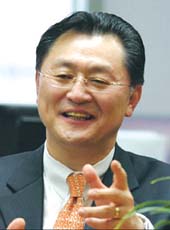Building Financial Silk Road
KIS works on financial network linking China, Vietnam and Indonesia
 Korea Investment & Securities Co.'s long-term vision is to become one of the top five investment banks in Asia by 2014 and a top integrated financial company in Asia by 2020, and is pushing hard to get there, the company said.
Korea Investment & Securities Co.'s long-term vision is to become one of the top five investment banks in Asia by 2014 and a top integrated financial company in Asia by 2020, and is pushing hard to get there, the company said.
To achieve these goals, the company has been busy exploring overseas financial markets in recent years. The construction of a business network linking Mongolia, China, Vietnam, Indonesia, India and Kazakhstan, a financial Silk Road in the modern age, has been what the company is after.
The company, in the first phase of its strategy, has been trying to open up China for listing Korean firms on its stock exchange, conduct M&As and invest in non-performing loans (NPL). To that end, the company signed tie-ups with a couple of Chinese securities firms in 2005 and last year.
KIS took it further by forming a partnership with a local municipal authority near Shanghai. The new company set up an industrial park in which Korean firms can establish factories, which they are now trying to attract.
 Furthermore, the company created a fund for investment in a development project under a financial advisory agreement signed with the city of Harbin.
Furthermore, the company created a fund for investment in a development project under a financial advisory agreement signed with the city of Harbin.
The company has been most active in Vietnam, where it plans to set up a joint venture securities firm. It has also launched the Vietnam Investment Fund. The company followed it with the creation of the Vietnam Real Estate Fund and the Vietnam Oil Field Fund and has been engaged in attracting investments into Vietnam and listing Vietnamese companies on the Korea Exchange.
Korea Investment & Securities has not left Indonesia out of its plans to open up financial markets in Southeast Asia to Korean financial firms. KIS feels that the country, endowed with abundant natural resources and political stability, is on the verge of take-off in economic terms.
The company signed a strategic alliance agreement with Dongsuh Kolibindo Securities Co. and plans to conduct M&As and invest in securities in Indonesia. The company has decided to invest $32 million in WEW Co., which has the right to develop forests in the country. The company plans to go further and participate in other projects such as iron ore and coal mining. The company is also in the middle of its plan to engage in the exploration for natural resources, mainly gold and oil, in Mongolia, Kazakhstan, and Libya. Officials of the company said they will fully utilize their Hong Kong subsidiary in order to acquire local securities firms through M&As in Asia.
KIS has already set up units to conduct market research in targeted Asian countries like Vietnam, China and Indonesia. In 2005, the company launched a market analyst team for emerging markets such as China and Vietnam. The research team has been publishing "China Compass"every month and "Vietnam Guide"bi-annually.
KIS began managing the installment-type Worldwide Vietnam Fund in November 2006 with 245.1 billion won.
The securities firm says, in regard to the fund, that Vietnam has been reforming and liberalizing its economy, society and politics, including its capital market, since 1986. The country began to build its infrastructure in order to help industrialize and modernize it by 2020. It has also been promoting foreign investment-friendly government policies including the reform of the foreign investment climate and reform of its state-owned companies.
Vietnam has been recording an economic growth rate second only to China in recent years, thanks to rising foreign investment and technologies matching its abundant natural resources and high-quality workforce.
Vietnam has been regarded as the last emerging market in Asia and, therefore, it would be a wise move to invest in the country early to maximize returns.
Vietnam's capital market is likely to sustain its growth continuously in the future thanks to its recent membership in the World Trade Organization and the continuous privatization of its state-run companies.
The capitalization of the securities market in Ho Chi Minh City has expanded to 3.4 trillion won from 500 billion won recently and will likely soon reach 5 trillion won, which is only 8.2 percent of GDP. This is a far lower portion of GDP than other countries such as the Philippines (117 percent), Malaysia (141 percent), Thailand (67 percent) and Indonesia (31 percent). The inflow of foreign investment continues at a rapid pace, ensuring that Vietnam's capital market will grow at a similar pace for the foreseeable future. nw
The website of Korea Investment & Securities Co.
President Ryu Sang-ho of Korea Investment and Securities Co.
3Fl, 292-47, Shindang 6-dong, Chung-gu, Seoul, Korea 100-456
Tel : 82-2-2235-6114 / Fax : 82-2-2235-0799